#globalisation
Text
I just saw the post about Quesadilla without cheese is just Dilla. And I think about the thing I hate the most about food globalisation.
The Raw Pad Thai.

No, motherfuckers!!!
Pad in Pad Thai means stir fried. There's no such thing like RAW Pad Thai.
This dish is just a Yum(Thai style spicy salad).
This is Pad Thai.

Pad Thai could be made vegan but it MUST be stir fried.
If you said the word raw Pad Thai I hate you all with a passion.
357 notes
·
View notes
Text
The aim is to limit trade in goods and services that are problematic in ecological and human rights terms, largely driven by corporations taking advantage of international wage and price differentials, and often not necessary at all. While degrowth also aims to restrict the international movement of capital – a policy that could play a key role in the transition phase to stabilize international markets – it pursues the expansion of trade that is beneficial (in particular to the Global South), cultural exchange and slow travel, and the freedom of movement of people. It is therefore a matter of regionally anchored but interconnected and open economic relationships and a much more localized production. Degrowth, accordingly, does not stand for cultural and nationalist isolationism, homogeneous bioregions, or competition-based economic protectionism, but for ‘open localism’. There is also the proposal to ‘Design global, produce local’, which is made increasingly possible through digital means of communication in combination with digitally controlled production. For example, open-source sharing of designs, building plans, and instructions for the production of goods enables localized production based on a global ‘digital commons’. At the global level, the aim is to avoid unnecessary transport and environmental costs through regionalization and to reduce regions’ dependencies on the world market.
The Future Is Degrowth: A Guide to a World Beyond Capitalism
111 notes
·
View notes
Text



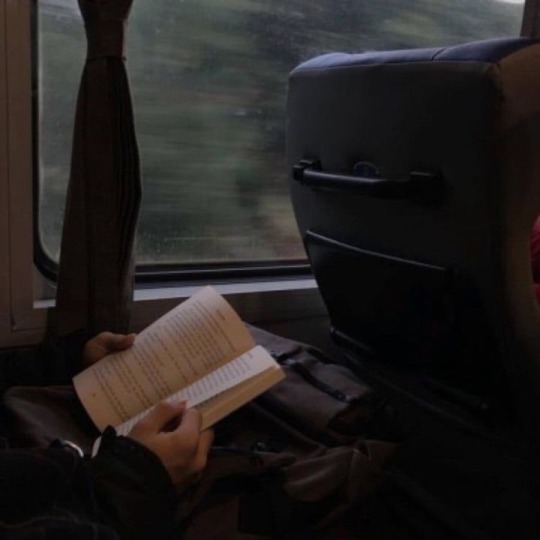
Reading List: Spirituality, Globalisation, Parenting and the 0.99 Cent Pricing Bias
What I’ve read (🖤) and planning to read (🤍)
Books
• Fall of human intellect - A Parvasarthy (genre: spirituality, humanness) 🖤
Academic Papers
The backlash against globalisation - Stefanie Walter (from annual review) 🤍
In recent years, the world has seen a rising backlash against globalization. This article reviews the nature, causes, and consequences of the globalization backlash. It shows that, contrary to a popular narrative, the backlash is not associated with a large swing in public opinion against globalization but is rather a result of its politicization. The increasing influence of globalization- skeptic actors has resulted in more protectionist, isolationist, and nationalist policies, some of which fundamentally threaten pillars of the contemporary international order. Both material and nonmaterial causes drive the glob- alization backlash, and these causes interact and mediate each other. The consequences are shaped by the responses of societal actors, national gov- ernments, and international policy makers. These responses can either yield to and reinforce the global backlash or push back against it. Understanding these dynamics will be an important task for future research.
The causes and consequences of urban riot and unrest - Tim Newburn (from annual review) 🤍
This review explores those varied bodies of work that have sought to un- derstand crowd behavior and violent crowd conduct in particular. Although the study of such collective conduct was once considered central to social science, this has long ceased to be the case and in many respects the study of protest and riot now receives relatively little attention, especially within criminology. In addition to offering a critical overview of work in this field, this review argues in favor of an expanded conception of its subject matter. In recent times, scholarly concern has increasingly been focused on ques- tions of etiology, i.e., asking how and why events such as riots occur, with the consequence that less attention is paid to other, arguably equally impor- tant questions, including how riots spread, how they end, and, critically, what happens in their aftermath. Accordingly, as a corrective, the review proposes a life cycle model of riots.
Parenting and it’s effects on children : reading and misreading behaviour genetics (from annual review) 🖤
There is clear evidence that parents can and do influence children. There is equally clear evidence that children’s genetic makeup affects their own behavioral characteristics, and also influences the way they are treated by their parents. Twin and adoption studies provide a sound basis for estimating the strength of genetic effects, although heritability estimates for a given trait vary widely across samples, and no one estimate can be considered definitive. This chapter argues that knowing only the strength of genetic factors, however, is not a sufficient basis for estimating environmental ones and indeed, that attempts to do so can systematically underestimate parenting effects. Children’s genetic predispositions and their parents’ childrearing regimes are seen to be closely interwoven, and the ways in which they function jointly to affect children’s development are explored.
More than a penny’s worth: left-digit bias and firm pricing- Avner Strulov-Shlain (from MorningBrew) 🤍
A penny saved. What’s the difference between $2.99 and $3.00? Basic math says one cent, but you probably perceive the difference to be about 22 cents, a new paper by a University of Chicago business school professor estimated. The research explores left digit bias—the phenomenon where consumers’ perceptions are overly influenced by the leftmost number in the price—and it brought receipts, analyzing retail scanner data on 3,500 products sold by 25 US chains. And while it might seem like every price you see ends in .99, the paper argues that retailers are leaving money on the table by underestimating this bias when setting prices.
#c suite#powerful woman#strong women#ceo aesthetic#personal growth#c suite aesthetic#working woman#beauty#empire#that girl#books#academic papers#parenting#globalisation#99 cents#0.99 marketing#marketing strategy#riots#spirituality#spiritual books
211 notes
·
View notes
Text
👹🧛🏿♂️☠️
#king charles iii#demon#crimes against humanity#these people are evil#globalisation#climate change#creating fear#wars#crimes against children#destruction#division#poverty#hunger#one world order#high end criminals#corruption#lies#fight for justice#standup#speak up#truth#please share#speaktruth#wwg1wga
32 notes
·
View notes
Text
i have to laugh, sometimes, about my poetry.
my first language is german. the way it is spoken on tv, ironed and pressed into my mother during hours and hours of language classes. “i was bullied for my dialect”, she will tell me when i am older, and shrug. “i did not want you to go through that.”
*
(understanding my grandfather was a walk on a razor’s edge, his voice too fast and too soft for me to make sense of. it felt, sometimes, as though he rolled german out as thin as he could on the kitchen counter, only to fold it back on itself. that is the wrong word, he’d say. we don’t use that here.
my mother followed him beat for beat.)
*
i go to school with twenty others, rocking on chairs and throwing erasers and pens from one table to the next. two of us have dialect colouring our words. when i ask my mother to teach me, she laughs.
“what for?”, she asks. “you can’t make the sounds anyway.”
*
(i start learning english when i am five years old. through songs, at first, laughing and pointing at body parts, talking more with my hands than my mouth. by the time i am 14, i am fluent enough to use social media in english.
it’s easier, somehow. the words have less weight. i throw myself into dictionaries and movies and shows. i throw myself into english, feet first, my eyes firmly closed.
“well, of course you speak english”, says a tourist when i’m sixteen and he shoves a map in my face, “don’t be ridiculous.” i tilt my head. i lie.
that afternoon, i don’t speak a single word of german.)
*
i try to use my mother’s dialect and she laughs. my sibling presses their lips together. “come”, says our mother. “what do you need it for?”
my friend speaks her dialect and people sneer. i speak my polished german and people draw up their noses.
are you german?
no.
on my tongue, my first language dies. in my city, most people my age speak german as it is on tv, a polished, pressed thing. their parents didn’t teach them, see.
*
funny, isn’t it, that this poem is in english?
#languages#on language and identity#this is rough but like. i needed to write it#for years actually#poetry#poets of tumblr#writerblr#writers of tumblr#globalisation#classism#fucking devils cycle#people think dialect is for stupid people so they dont teach their kids and then their kids dont know their own goddamn dialect and end up#speaking german in such a way that we dont even sound like we belong
373 notes
·
View notes
Note
No, US american "culture" is a filthy parasite that must be exterminatrd. There is no us culture not filtered by hate and obsession with fictional media such as television and movies. We have no history that isn't violence and rape. There is black culture and culture brought over by others that has been stolen and twisted into an ugly, vile child. It must be exterminated for the world to propser.
I appreciate the fact that you're trying to participate in the conversation, especially as an American yourself, I presume.
Americans do have a culture. You have a shared history, generally speak the same language, share in traditions. You have regional differences to distinguish yourselves by, and foods that people in other corners of the world don't eat. You have unique struggles that can be similar to that of people from other nations, but that are ultimately your shared own.
Americans, in the broad sense, use words in the English language that English people don't use. Your language evolved in a unique way from them. That is culture.
You have styles and genres of music that originated on American soil. That is culture.
You have a history of violence, yes, but also of victory, of revolution, of the small people fighting for their freedom and rights, and being strong for their people and their country. That history is also culture.
And frankly, I'm sure I'm not even going to convince you with all of this. Who am I but a small speck on the other side of a great big ocean, right? What do I know about America?
So just let me reiterate the only thing I hope you'll take from this. You. Are. Of. No. Use. To. ANYONE. Self. Flagellating. About. The. Country. You. Are. From.
You don't help your online friends from far coasts who are forced to engage with you using American social norms. You don't help victims of war in the Middle East. You don't help the residents of American territories that still haven't got a right to a vote. You're not helping young people of colour in your prisons on a blown-up drug charge that are being denied their right to vote. You are not even helping yourself, because newsflash, the "good person" high you get from patting yourself on the back for having a woke opinion doesn't last forever, and in the end you will be left a hollow shell of self-hatred.
Unlearn that shit. Pour your energy in stuff that is worthwhile. Ask your online friends about their cultures. Share in the joy that is having international connections. Join a local activist group. Read about countries on Wikipedia and fantasise about visiting them someday. I don't care what you do with your time. But don't spend it condemning a country and the people in it who love it just because you happen to feel bad or guilty about the place you grew up. You're not doing anyone any favours with it.
#globalisation#america#american culture#usa#i get that sometimes it feels like all you can do is hate but come on man. doesnt it get tiring
34 notes
·
View notes
Photo

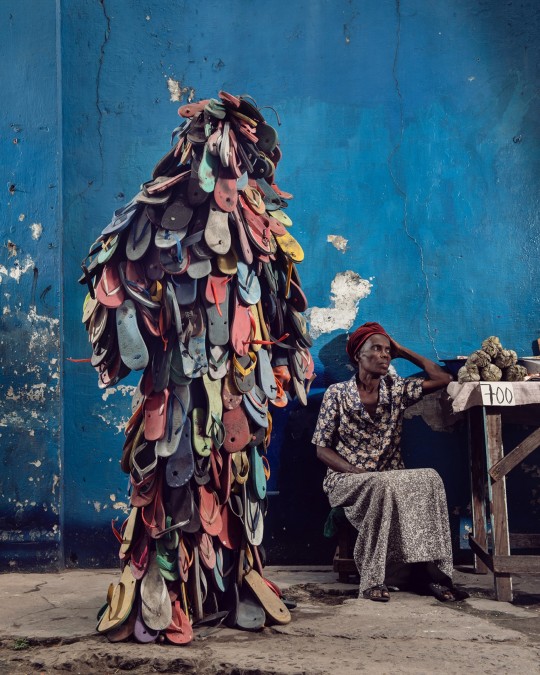
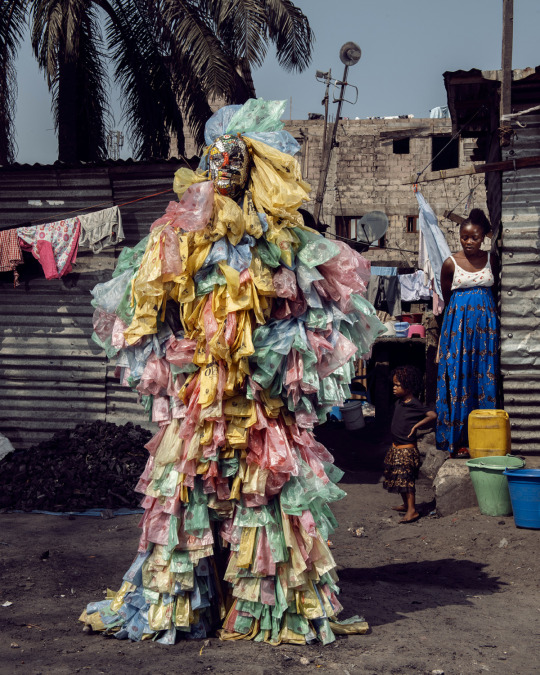
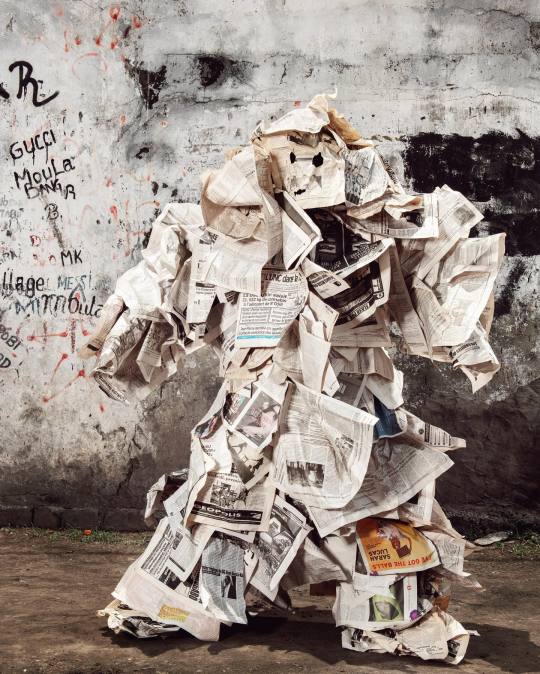
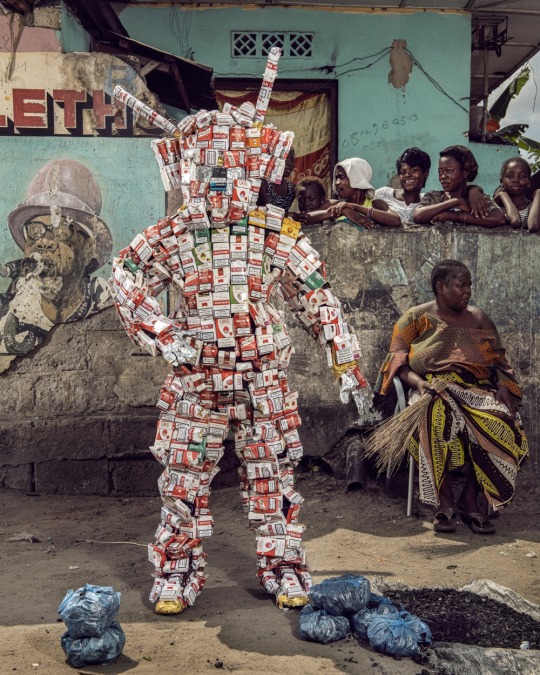





Transforming Trash into Protest Art
The second largest country in Africa, the Democratic Republic of Congo has one of the richest sub-soils in the world in gold, coltan, diamonds, cobalt, oil... and yet remains the 8th poorest country on the planet.
The Congolese are among the biggest losers of globalisation. They rarely benefit from the products manufactured with the resources drawn from their country. In general, these products reappear in Africa in the third or fourth generation; at best they are outdated, but more often than not, they are no more than the waste products of industrialised countries that prefer to relocate their processing.
The DRC is experiencing an ecological scandal, but just as an alchemist transforms lead into gold, "Ndaku, la vie est belle" was born from these tons of rubbish. It was founded six years ago in Kinshasa by the artist Eddy Ekete, and today it brings together nearly 25 artists, almost all of whom were trained at the Kinshasa Academy of Fine Arts.
Painters, singers, visual artists and musicians have joined forces to denounce the tragedy of their daily lives, the wars that have resulted from them, the exploitation of women and men that stems from them and ferments the unfathomable misery that robs them of their dignity.
Originally, these artists had in common that they had no resources, no support and that they lived in a shanty town in Kinshasa, built on land filled with tons of untreated waste. Naturally, they found an abundance of free raw material in these remains.
Mobile phones, plastic, corks, everything is raw material - and yet already industrialised! - to denounce the chaos in which the country is kept.
If Congo Kinshasa has partly lost its animist and mystic traditions under the pressure of Catholicism and colonisation, the artists of the collective "Ndaku, la vie est belle" return to the traditional source of the African mask.
Courtesy of Stephan Gladieu
#art#congo#DRC#trash#sustainability#equal rights#stephan gladieu#mask#africa#sustainable development#eddyekete#upcycling#recycling#streetart#human rights#ecology#fashion#costumes#kinshasa#globalisation#ndaku#poetry#hope
185 notes
·
View notes
Note
I honestly don't understand people's obsession with wanting greek shows to be bought by netflix or other foreign platforms, as if that and american recognition will validate their quality (or as if netflix or disney+ are the standard for good tv. Please). Maybe the obsession with globalisation should stop and I'm not only talking about greece, but most countries. Not targeting anyone, just raising another point.
I see your point. At least in my case, it���s not an obsession with globalisation but rather a desire that good work can transcend narrow borders. Even beyond the border thing, if any work (i.e an American song) doesn’t get the recognition I think it deserves, I get pretty disappointed.
Aside from my personality trait, there is another reason Greeks want this. It’s been too long that we are carrying the burden of the stereotype that “we don’t produce anything of value” and we would appreciate it if this very harmful stereotype was negated. We think this show was solid work and we would like to show that there’s more we can do than carry Tzatziki and souvlaki to tavern tables.
On the contrary, I believe this need observed in Greece and other small or “less known” countries stems from a need to fight globalisation. It’s a struggle to assert own skills and powers against the all consuming English / American and a few others’ media.
I do acknowledge that there are some Greeks however who wait for foreign validation to form an opinion of their own. Some were mocking the decision to send Maestro on Netflix because “it could never be on the level of foreign shows”. (It perfectly is, and better than average in performances, music and cinematography.) Sorry to say this, but these people are born losers. They do inhabit Greece and the Balkans in considerable numbers. This stems from an inferiority complex Eastern Europe has opposite Western Europe.
*We know Netflix also has mostly trash but there is no more efficient way to get out there now, is there? Let alone that Greeks are always paranoid that Greek trash stinks harder than others’ trash anyway.
#Greece#globalisation#Netflix#stereotypes#maestro in blue#maestro#greek tv series#greek tv#opinion#anon#mail
47 notes
·
View notes
Text
Every biologist knows that small groups in isolation evolve fastest. You put a thousand birds on an ocean island and they'll evolve very fast. You put ten thousand on a big continent, and their evolution slows down. Now, for our own species, evolution occurs mostly through our behavior. We innovavate new behavior to adapt. And everybody on earth knows that innovation only occurs in small groups. Put three people on a committee and they may get something done. Ten people, and it gets harder. Thirty people, and nothing happens. Thirty million, it becomes impossible. That's the effect of mass media - it keeps anything from happening. Mass media swamps diversity. It makes every place the same. Bangkok or Tokyo or London: there's a McDonald's on one corner, a Benneton on another, a Gap across the street. Regional differences vanish. All differences vanish. In a mass-media world, there's less of everything except the top ten books, records, movies, ideas. People worry about losing species diversity in the rain forest. But what about intellectual diversity - our most necessary resource? That's disappearing faster than trees. But we haven't figured that out, so now we're planning to put five billion people together in cyberspace. And it'll freeze the entire species. Everything will stop dead in its tracks. Everyone will think the same thing at the same time. Global uniformity.
#quotes#jurassic park#the lost world#michael crichton#interesting#globalisation#social media#brain rot for being chronically online
14 notes
·
View notes
Photo

The bigger things get the smaller and duller or flatter the globe gets. It is getting to be all one blasted little provincial suburb. When they have introduced American sanitation, morale-pep, feminism, and mass production throughout the Near East, Middle East, Far East, U.S.S.R., the Pampas, el Gran Chaco, the Danubian Basin, Equatorial Africa, Hirther Further and Inner Mumbo-land, Gondhwannaland, Lhasas, and the villages of darkest Berkshire, how happy we shall be. At any rate it out to cut down travel. There will be nowhere to go. So people will (I opine) go all the faster.
- J.R.R. Tolkien, The Letters of J.R.R. Tolkien
#tolkien#jrr tolkien#quote#literature#author#writer#lord of the rings#books#globalisation#anti-globalisation#society#culture#icon#british
106 notes
·
View notes
Text
While Marx often shows enthusiasm for the potentiality of enhanced forms of human cooperation enabled by globalizing production, already in the nineteenth century, he observed an antagonistic separation of town and country and suggested that production chains were overstretched and wasting resources. Today, lessening the spatial disjuncture between production and consumption must be an explicit feature and aim of sustainable and just transition and, in this context, calls on the left for partial deglobalization, including the shortening of commodity chains, have merit and are quite consistent with Marx’s analysis. In a process of partial deglobalization, production for local and domestic needs—rather than production for export—would again become the center of gravity of the economy. A move away from the export orientation of domestic corporations and a process of renationalization could also allow enterprises to begin to develop their own strategies, moving away from the whims of the global market and choices taken by corporate controllers.
Such transformation could enable spaces for independent development in the Global South. To do so, they could focus on shifting agrarian systems, orienting their production away from agro-export (which is a source of tremendous ecological irrationality and unequal exchange) toward food sovereignty. Such shifts would need to be accompanied by simultaneous, coordinated shifts toward enhanced local and domestic food production in Global North, alongside a move from high-input agriculture to agroecology, and, in settler colonial contexts, enhanced Indigenous sovereignty. Within domestic spaces or regions, efforts must simultaneously be made to mend a rift between the city and the country. For a model of the environmentalist city, one could look to Havana for inspiration. During Cuba’s Special Period in the 1990s, organic, low-input agriculture was developed both in the countryside, as well as in the island’s capital through urban farms. Urban agriculture is here not niche or small-scale—it covers large expanses within and at the outskirts of the city, where rich land is located. In the transition to renewables, energy production should also be localized as much as possible. This is a potentiality inherent in renewable energy “flow,” in contrast to concentrated energy “stock,” or fossil fuels.
While lessening the spatial disjuncture between production and consumption is part of developing ecologically rational production, this aim should be recognized to be in some tension with economic planning (at least in the longer term), insofar as expansive planning is potentiated by the socialization of production. Thus, calls for localization of production imply a diminishment in productive association across firms and regions and the potential to plan such interconnections.
Practically, it is important to recognize that such a process confronts material interdependencies, as existing productive networks and infrastructural configurations support and sustain huge swaths of human life. Different regions and cities also have different specializations and different ecological capacities. In an existing world of evolved economic interdependencies, the reproductive needs of various communities require continued global resource flows. Climate change also creates severe survival and livelihood challenges on a highly uneven basis, and global trade and divisions of labor can act as safeguards against issues such as pandemics related to water-supply failures and reduced agricultural yields. More broadly, we should carefully consider Marx’s suggestion that well-organized territorial divisions of labor are collective powers and can be a part of collaboration in human affairs. This extends to territorial specialization, which, consciously organized, could involve a collaborative partitioning of resources and capacities.
37 notes
·
View notes
Text

Athens Airport, 19 April 2024
#BlackandWhite#Airport#Acropolis#Arrival#Athens#City#Europe#Globalisation#Greece#JohnPerivolaris#Journey#FujifilmXF10#Mediterranean#Monochrome#Non-Place#OneWoman#Passenger#Sleep#Attiki#SIlverEfexPro2
2 notes
·
View notes
Photo



Buddleja davidii (Butterfly bush) and Apis mellifera (Western honey bee)
Globalisation
Whenever I’m visited by out-of-town friends in the summer, I usually take them down to the beach to get a bit of that West Coast vibe. The plant community is the very picture of globalisation because the only native plant that I see in abundance is the common horsetail (Equisetum), and that doesn’t count because horsetails are found everywhere except Antarctica.
This species of Butterfly bush (Buddleja davidii) is originally from central China and parts of Japan. It arrived in European gardens in the 1890′s and was already being declared an ‘invasive weed’ in Britain in 1922. Here it prospers on the other side of the Pacific Ocean, “duking it out” with a host of other introduced plant species.
Butterfly bush is often grown as a garden ornamental because it is attractive to butterflies. However, this particular ‘garden escapee’ is being pollinated by a honey bee. Butterflies are sensitive to habitat destruction, pesticide use and, increasingly, climate change. As local gardeners, we don’t see that many butterflies around these days but these honey bees are part of the problem too.
In 2021 the global honey market was worth 8 billion dollars with over 94 million registered bee hives world-wide. The number of hives is expected to grow another 8% in the next five years. Each bee hive can consume 250 kilos of nectar and 50 kilos of pollen a year, and this represents enormous competition to native pollinators of all kinds, especially bumblebees and butterflies. Some jurisdictions are now considering restricting the number of honey bee hives to assist conservation efforts and increase biodiversity.
#flowers#photographers on tumblr#butterfly bush#honey bee#globalisation#fleurs#flores#fiori#blumen#bloemen#white rock beach#vancouver
111 notes
·
View notes
Text
LISTEN TO THIS LUNATIC IF YOU HAVEN’T YET
🤨🤨🤨
#benjamin netanyahu#monster in disguise#psychopath#sociopaths#deep state clown#dirty politics#crimes against humanity#covid#vaccines#mrna#mind control#depopulation agenda#globalisation#one world order#corruption#these people are evil#speaktruth#fight for justice#standup#speak up#truth#please share#wwg1wga
13 notes
·
View notes
Quote
To sum up, what is free trade, what is free trade under the present condition of society? It is freedom of capital. When you have overthrown the few national barriers which still restrict the progress of capital, you will merely have given it complete freedom of action.
Marx, On Free Trade, 1848
30 notes
·
View notes